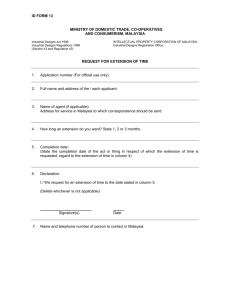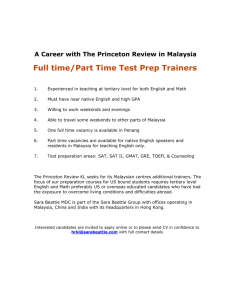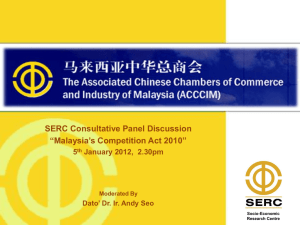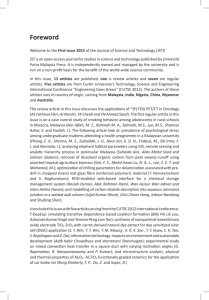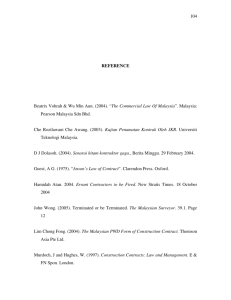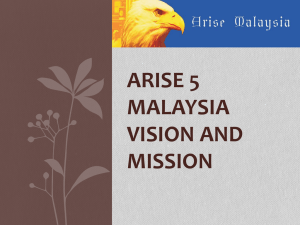Malaysian Tax System
advertisement
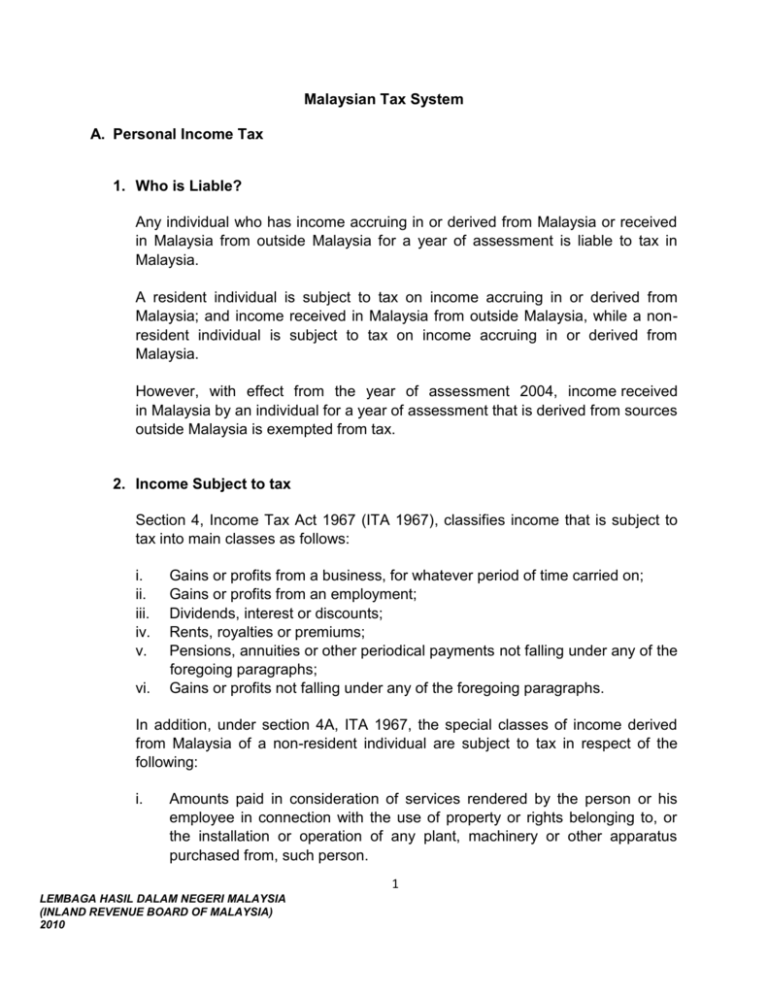
Malaysian Tax System A. Personal Income Tax 1. Who is Liable? Any individual who has income accruing in or derived from Malaysia or received in Malaysia from outside Malaysia for a year of assessment is liable to tax in Malaysia. A resident individual is subject to tax on income accruing in or derived from Malaysia; and income received in Malaysia from outside Malaysia, while a nonresident individual is subject to tax on income accruing in or derived from Malaysia. However, with effect from the year of assessment 2004, income received in Malaysia by an individual for a year of assessment that is derived from sources outside Malaysia is exempted from tax. 2. Income Subject to tax Section 4, Income Tax Act 1967 (ITA 1967), classifies income that is subject to tax into main classes as follows: i. ii. iii. iv. v. vi. Gains or profits from a business, for whatever period of time carried on; Gains or profits from an employment; Dividends, interest or discounts; Rents, royalties or premiums; Pensions, annuities or other periodical payments not falling under any of the foregoing paragraphs; Gains or profits not falling under any of the foregoing paragraphs. In addition, under section 4A, ITA 1967, the special classes of income derived from Malaysia of a non-resident individual are subject to tax in respect of the following: i. Amounts paid in consideration of services rendered by the person or his employee in connection with the use of property or rights belonging to, or the installation or operation of any plant, machinery or other apparatus purchased from, such person. 1 LEMBAGA HASIL DALAM NEGERI MALAYSIA (INLAND REVENUE BOARD OF MALAYSIA) 2010 ii. iii. Amounts paid in consideration of technical advice, assistance or services rendered in connection with technical management or administration of any scientific, industrial or commercial undertaking, venture, project or scheme; Rent or other payments made under any agreement or arrangement for the use of any moveable property. 3. Capital Gains In Malaysia, capital gains tax is in the form of Real Property Gains Tax (RPGT). RPGT is applicable on gains arising from the disposal of real property in Malaysia. RPGT is also charged on the disposal of shares in a real property companies (RPC). An RPC is a controlled company which owns real property or shares or both where the defined value of such assets is not less than 75% of the value of the company’s total tangible assets. Prior to 1 January, the P.U (A) 146. Real Property Gains Tax (Exemption) (no.2) Order 2007 exempts all disposals of chargeable assets after 31 March 2007 from RPGT. With effect from 1 January 2010, disposal of real properties that are held for 5 years and below are subject to RPGT. The effective RPGT tax rate is 5%. 4. Taxation of Employer - Provided stock option Employee Share Option Scheme (ESOS) is taxable as part of employment income of an individual. ESOS is chargeable to tax on the difference between the market value and the offer price of the share at the date of the offer of the option (if any). The amount of benefit from Employee Share Option Scheme (ESOS) which is assessed as a perquisite is determined as follows: Ringgit Malaysia (RM) Market value of share at the date of offer of the option Less: Offer price of share at the date of the offer of the option (if any) Taxable amount XXX XXX XXX For tax computation purpose, this benefit is related back to the basis period for the year in which the option is offered. 2 LEMBAGA HASIL DALAM NEGERI MALAYSIA (INLAND REVENUE BOARD OF MALAYSIA) 2010 5. Deduction Tax deductions on personal income tax for resident individuals effective from year of assessment 2010 are as follows: Types of deductions Limit (RM) ___________________________________________________________ Self 9,000 Additional deduction for disabled individual 6,000 Wife/husband 3,000 Additional deduction for disabled wife/husband 3,500 Medical expenses for parents 5,000 Purchase of supporting equipment for disabled self, spouse, child or parent 5,000 1 Education fees (self) 5,000 Medical expenses on serious disease for self, spouse or child (including fees up to RM500 incurred for complete medical Examination) 5,000 Purchase of books/journals /magazines/similar publications 1,000 Purchase of personal computer (allowed once every 3 years) 3,000 Net deposit in Skim Simpanan Pendidikan National 3,000 Purchase of sports equipment 300 Interest on housing loans (conditions for eligibility) 10,000 Broadband subscription fees 500 Child (unmarried) i. Below 18 year 1,000 ii. 18 years and above and: a) Schooling 1,000 b) Studying in any institution of higher learning - In Malaysia 4,000 1 Degree at Masters or Doctorate level – for acquiring any skill or qualification / Other than a degree at Masters or Doctorate level – for acquiring law, Islamic financing, technical, vocational, industrial, scientific or technological skills or qualifications 3 LEMBAGA HASIL DALAM NEGERI MALAYSIA (INLAND REVENUE BOARD OF MALAYSIA) 2010 - Outside Malaysia iii. Disabled child Employees Provident Fund (EPF) and life insurance Annuity scheme premium Education and medical insurance 4,000 5,000 6,000 1,000 3,000 6. Income Tax Rates i. Resident Individuals Resident individuals are subject to income tax at progressive rates as follows (Year of Assessment 2010): Chargeable Income (Malaysian Ringgit) Up to 2,500 2,501 – 5,000 5,001 - 20,000 20,001 - 35,000 35,001 - 50,000 50,001 - 70,000 70,001 - 100,000 Exceeding 100,000 Marginal Tax Rate (%) 0 1 3 7 12 19 24 26 Preferential tax rate of 15% is given to knowledge workers in Iskandar Malaysia. ii. Non-Resident Individuals (Year of assessment 2010). Generally, non-resident individuals are subject to tax at a flat rate of 25%. Where a double taxation agreement applies, the general tax rates according to the type of incomes are as tabled below. However, variation in tax rate is applicable with regards to interest, royalty and special classes of income as specified by a particular Double Taxation Agreement (DTA). Types of income Interest Royalty Entertainer’s professional income Special classes of income: 4 LEMBAGA HASIL DALAM NEGERI MALAYSIA (INLAND REVENUE BOARD OF MALAYSIA) 2010 Rate (%) 15 10 15 Rental of movable property 10 Fees for technical or management services performed in Malaysia 10 Payment for services rendered in Malaysia in connection with use of property or installation or operation of any plant, machinery or other apparatus purchased from a non-resident person 10 Dividends Business and other incomes Real estate investment trust (REIT) 25 25 10 7. Tax Filing and Payment Procedure Under the self assessment system, individuals are required to ‘file and pay’ their tax within the time stipulated. Every person must file a tax return is he has: i. Chargeable income for a year of assessment; or ii. No chargeable income for that year of assessment but; has chargeable income for the year of assessment immediately preceding that year of assessment or has furnished a return for the immediately preceding year; or has been required to furnish a return for the immediately preceding year. The tax filing deadline for a year of assessment for a person carrying on a business is 30 June of the following year, while the deadline for a person who receives income from other than business source is 30 April of the following year. All taxpayers, except for employees are covered under a compulsory instalment payment scheme. Lembaga Hasil Dalam Negeri Malaysia (LHDNM) determines the estimated tax payable based on the tax assessed in the preceding year. The taxpayer is required to pay the estimated tax payable in six bi-monthly instalments as directed by LHDNM beginning from the month of March. For individuals with employment income, income tax is deducted through the monthly salary deductions under the Schedular Tax Deductions (STD) scheme. Employers are required to deduct tax monthly from their employees’ 5 LEMBAGA HASIL DALAM NEGERI MALAYSIA (INLAND REVENUE BOARD OF MALAYSIA) 2010 remuneration and remit it to Lembaga Hasil Dalam Negeri Malaysia by the tenth day of the following month. 8. Tax Treaties Currently, Malaysia has entered into treaties to mitigate double taxation with 68 countries listed below: Albania Argentina Australia Austria Bahrain Bangladesh Belgium Brunei Canada China Chile Croatia Czech Republic Denmark Egypt Fiji Finland France Germany Hungary India Indonesia Iran B. Corporate Income Tax Ireland Italy Japan Jordan Kazakhstan Korea Kuwait Kyrgyz Lebanon Luxembourg Malta Mauritius Mongolia Morocco Myanmar Namibia Netherlands New Zealand Norway Pakistan Papua New Guinea Philippines Poland 1. Income Subject to Tax 6 LEMBAGA HASIL DALAM NEGERI MALAYSIA (INLAND REVENUE BOARD OF MALAYSIA) 2010 Qatar Romania Russia Saudi Arabia Seychelles Singapore South Africa Spain Sri Lanka Sudan Sweden Switzerland Syria Thailand Turkey Turkmenistan United Arab Emirates United Kingdom United States of America Uzbekistan Venezuela Vietnam Resident companies are subject to tax on income accruing in or derived from Malaysia. Income received in Malaysia from outside Malaysia is exempt from tax, except for companies carrying on the business of banking, insurance or sea or air transport. Assessable incomes for companies includes gains from a business, dividends, interest and rentals, royalties, premiums and other gains and profits. Non-resident companies are subject to tax only on income accruing in or derived from sources within Malaysia. Foreign income is exempt, whether received in Malaysia or not. Business income of non-residents derived through a permanent establishment in Malaysia is subject to tax. 2. Asset Depreciation For tax computation purpose, depreciation of asset is not an allowable deduction. Instead, a taxpayer has the option to claim for capital allowances on the capital expenditure incurred on assets employ for use in a business. The prescribed rates of annual allowances applicable to the various plant and machinery are classified into 3 main categories as follows: Types of asset Office equipment, furniture and fitting Plant and machinery (general) Heavy machinery, motor vehicles Rate (%) 10 14 20 For simplicity, capital allowance at 100% will be given for small value assets not exceeding RM1,000 each. Where for a year of assessment, the total amount of qualifying capital expenditure for small value assets is over RM10,000, the allowable capital allowance is restricted to RM10,000. Small and medium enterprises (SMEs) are however not subject to the maximum limit of RM10,000 for capital allowances on small value assets and are allowed to claim the full capital allowance on all the small value assets within one year. 3. Royalties and Technical Assistance Fees 7 LEMBAGA HASIL DALAM NEGERI MALAYSIA (INLAND REVENUE BOARD OF MALAYSIA) 2010 3.1 Royalties In Section 2 of the Income Tax Act (ITA) 1967, royalty is defined as: "royalty" includes (a) any sums paid as consideration for the use of, or the right to use(i) copyrights, artistic or scientific works, patents, designs or models, plans, secret processes or formulae, trademarks, or tapes for radio or television broadcasting, motion picture films, films or video tapes or other means of reproduction where such films or tapes have been or are to be used or reproduced in Malaysia or other like property or rights; (ii) know-how or information concerning technical, commercial or scientific knowledge, experience or skill; industrial, (b) income derived from the alienation of any property, know-how or information mentioned in paragraph (a) of this definition; Section 109 ITA 1967 provides for the withholding of tax from royalties paid or credited by Malaysian businesses to non-resident persons. Any person in Malaysia who is liable to pay a royalty, which has a Malaysian source to: i. a company, partnership or any other body of persons which does not carry a business in Malaysia; or ii. an individual who is not known to him to be resident in Malaysia. The royalty is deemed to derive from Malaysia if: i. the responsibility for payment lies with the Government or a State Government; or ii. the responsibility for payment lies with a resident of Malaysia; or iii. the royalty is charged as an outgoing or expense against any income accruing in or derived from Malaysia. The gross amount of royalty paid to a non-resident payee is subject to withholding tax at 10% or any other rate as prescribed under the Double 8 LEMBAGA HASIL DALAM NEGERI MALAYSIA (INLAND REVENUE BOARD OF MALAYSIA) 2010 Taxation Agreement between Malaysia and the country where the nonresident payee is a tax resident. The withholding tax is a final tax, therefore the non-resident payee need not declare that income in the return form. 3.2 Technical Assistance Fees and Management Assistance Income from technical assistance and management assistance are classified as special classes of income which fall under Section 4A of the Income Tax Act 1967. 4A. Notwithstanding the provisions of section 4 and subject to this Act, the income of a person not resident in Malaysia for the basis year for a year of assessment in respect of(i) amounts paid in consideration of services rendered by the person or his employee in connection with the use of property or rights belonging to, or the installation or operation of any plant, machinery or other apparatus purchased from, such person; (ii) amounts paid in consideration of technical advice, assistance or services rendered in connection with technical management or administration of any scientific, industrial or commercial undertaking, venture, project or scheme; or (iii) rent or other payments made under any agreement or arrangement for the use of any moveable property, which is derived from Malaysia is chargeable to tax under this Act. Section 4A income which is derived from Malaysia is chargeable to income tax. It covers not only technical services but also non-technical specialized services. Payment made for management or administrative services which includes the passing over or utilization of expert or specialized knowledge, skills or expertise. It covers the provision of marketing, consultancy and legal services, supply of technical and software personnel and intercompany technical services, also management and administrative functions such as planning, direction, control, co-ordination, accounting, financial management consultation and labour negotiations. 9 LEMBAGA HASIL DALAM NEGERI MALAYSIA (INLAND REVENUE BOARD OF MALAYSIA) 2010 Any payments made for ordinary day to day administration or management services of a routine nature, such as the share of overhead expenses incurred by the head office of a branch or by the parent company of a subsidiary and charged to the branch or subsidiary are excluded. Section 109B provides for the payer to withhold tax from payments made under Section 4A. The tax withholding rate is 10% of the gross payment. The tax in respect of Section 4A is the final tax. However, if the recipient has a place of business in Malaysia he/she may submit a return and claim relief for the withholding tax suffered. 4. Management Assistance As 3.2 above. 5. Permanent Establishment In the case of non-resident companies, tax is only charged on income accrued or derived from Malaysia, thus a non-resident company carrying on a world-wide trade will be taxed in Malaysia only on that part of its which it carries on in Malaysia. The term ‘Permanent Establishment’ does not appear in the ITA 1967 therefore no definition is given in the ITA. In the Double Taxation Agreement (DTA) that Malaysia had with the other treaty countries, ‘Permanent Establishment’ is defined as a fixed place of business through which the business of an enterprise is wholly or partly carried on. The concept of permanent establishment (PE) is used for the purpose of determining the right of a Contracting State to tax the profits of an enterprise of the other Contracting State. Such treaties provide that an enterprise of one Contracting State shall be taxable on its profits in the other State only if it maintains a PE in the latter State and only to the extent that the profits earned by the enterprise in that State are attributable to that PE. This definition, therefore, contain the following conditions: i. the existence of a “place of business”, i.e. a facility such as premises or, in certain instances, machinery or equipment; 10 LEMBAGA HASIL DALAM NEGERI MALAYSIA (INLAND REVENUE BOARD OF MALAYSIA) 2010 ii. this place of business must be “fixed”, i.e. it must be established at a distinct place with a certain degree of permanence; iii. the carrying on of the business of the enterprise through this fixed place of business. This means usually that persons who, in one way or another, are dependent on the enterprise (personnel) conduct the business of the enterprise in the State in which the fixed place is situated. The term “place of business” covers any premises, facilities or installations used for carrying on the business of the enterprise whether or not they are used exclusively for that purpose. It is immaterial whether the premises, facilities or installation are owned or rented by or are otherwise at the disposal of the enterprise. A place of business may thus be constituted by a pitch in a market place, or situated in the business facilities of another enterprise. The place of business must be “fixed”. In the normal way there has to be a link between the place of business and a specific geographical point. It is immaterial how long an enterprise of a Contracting State operates in the other Contracting State if it does not do so at a distinct place, but this does not mean that the equipment constituting the place of business has to be actually fixed to the soil on which it stands. It is enough that the equipment remains on a particular site. 6. Representation Office Non –resident companies or enterprises which intend to extend their activities to Malaysia can do so by having a representation office in Malaysia. Activities through this office are not tantamount to carrying on a business in Malaysia and the foreign company will not therefore be exposed to tax in Malaysia. In such cases the representative is considered to be carrying on an employment here. There are very definite limitations to the operations the foreign company can carry on through it representative. A representative cannot operate a manufacturing organization and pay staff and disburse funds received from his principal. The principal, on the other hand, cannot consign stocks, materials, equipment etc to its representative for him to effect sales or enter into contracts in Malaysia in its name. If such activity is being carried on in Malaysia, the company would be deemed to be carrying on a business in Malaysia. However, if the representative merely carries stock of samples in order to deal with queries from existing and potential customers, it is not exposed to tax in Malaysia. 11 LEMBAGA HASIL DALAM NEGERI MALAYSIA (INLAND REVENUE BOARD OF MALAYSIA) 2010 Generally, representatives are located in Malaysia for information gathering and supply purposes. As long as the companies confined themselves to such related activities there is no exposure to Malaysian tax. Some of the common activities that are carried out are: i. Manufacturing surveys; ii. Establishing contact with supplies and consumers; iii. Furnishing head office with marketing studies of various countries in the region; iv. Providing after sales advice and back up information; v. Generally acting ad promotional and liaison contacts between head office and the manufacturers/consumers in the region. Foreign corporations in the manufacturing and trading sector, and foreign institutions in the banking sector are allowed to set up representative offices in Malaysia to perform certain activities for their head offices/ principal/ foreign interests. The setting up of representative offices in the manufacturing and trading sector requires the approval of the Ministry of International Trade and Industry, while in the banking sector, the approval of Bank Negara is required. 12 LEMBAGA HASIL DALAM NEGERI MALAYSIA (INLAND REVENUE BOARD OF MALAYSIA) 2010
